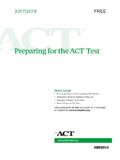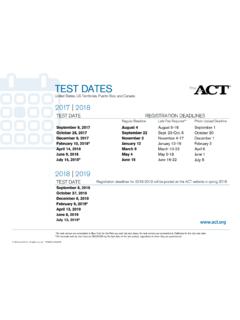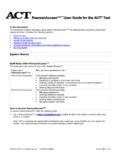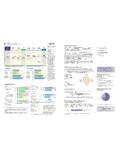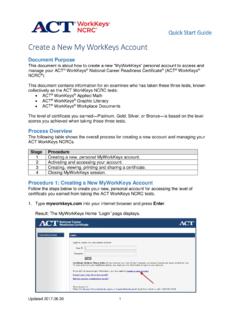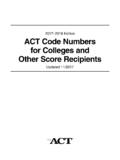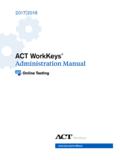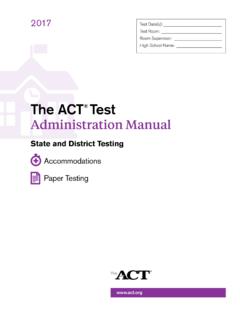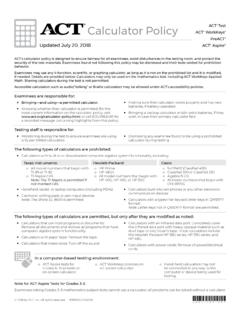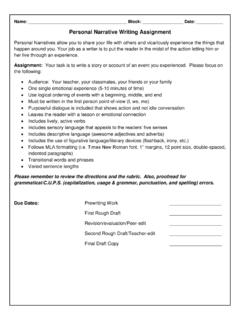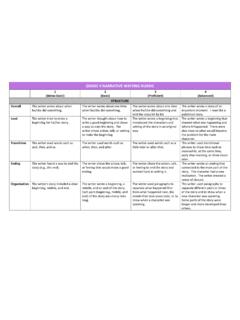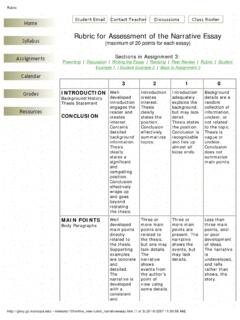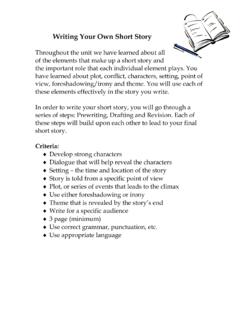Transcription of Exemplar Grade 6 Writing Test Prompt - ACT
1 Exemplar Grade 6 Writing Test 2017 by ACT, Inc. All rights reserved. The ACT test and ACT Aspire are registered trademarks of ACT, Inc. AS1017 1 InTroduCTIonIntroductionThis booklet explains the ACT Aspire Grade 6 Writing test by presenting a sample test Prompt . The Prompt is accompanied by an explanation of the Writing task and by scored student responses that illustrate student Writing at different score points on the test rubric . The Exemplar test Prompt included here is representative of the range of content and types of questions found on the ACT Aspire Grade 6 Writing test. Educators can use this resource to Become familiar with ACT Aspire Writing test prompts Help reinforce or adjust teaching and learning objectives See examples of actual student Writing that have been scored and annotated according to the Writing test analytic scoring rubricWriting FrameworkThe ACT Aspire Writing assessments are timed tests consisting of a single summative Writing task at each Grade .
2 The tests are 45 minutes in duration in grades 3 through 5 and 40 minutes in grades 6 through early high school (grades 9 and 10). The tasks target one of three primary modes of Writing : reflective narrative , analytical expository, and persuasive/argumentative. The assessments are designed to provide a strong indication of whether students have the Writing skills they will need to succeed as they begin work at their next Grade level. All Writing tasks are designed to target a depth of knowledge (DOK) level Student responses are evaluated according to analytic rubrics that assess the generation, development, organization, and communication of ideas in standard written English. Because there is one extended Writing task at each Grade level, ACT Aspire rotates through the three modes to ensure coverage across the grades.
3 The reflective narrative mode appears at grades 3 and 6. The analytical expository mode appears at grades 4 and 7 and at early high school. The persuasive/argumentative mode appears at grades 5 and 8. The ACT Aspire assessments are designed to give students at every Grade level an opportunity to display the higher-order thinking skills needed for meaningful reflection, analytical explanation, or persuasive as a whole, the ACT Aspire Writing assessments are intended to reflect an integrated continuum of Writing ability that advances in skill and complexity Grade by Grade . This continuum culminates in the ACT Writing test, which provides a measure of student readiness for the 1 Norman L. Webb, Depth-of-Knowledge Levels for Four Content Areas, last modified March 28, 2002, demands of college.
4 Together with the ACT Aspire English assessment, the Aspire Writing assessment targets Common Core State Standards for Writing as well as Writing skills that ACT s research has identified as being important for developing college and career readiness. Writing Competencies and Analytic ScoringThe Writing Test is scored with a four-domain analytic scoring rubric . Each Grade level has a unique rubric because the Writing tasks assess different Writing modes, but the underlying design is the same across grades. Each of the four rubric domains corresponds to a different trait of the Writing sample; traits in the Writing sample are evidence of the Writing competencies described below. In addition to an overall ELA score, which incorporates performance on the Writing test, students receive scores in four reporting categories that correspond to these analytic rubric narrative /Analysis/ArgumentThe name of the first rubric domain corresponds to the mode of Writing assessed at the Grade level.
5 Regardless of the mode, this rubric domain is associated with the writer s generation of ideas. Scores in this domain reflect the ability to generate productive ideas and engage with the Writing task. Depending on the mode, writers generate ideas to provide reflection, analysis, or persuasive and reasoned argument. Competent writers understand the topic they are invited to address, the purpose for Writing , and the audience. They generate ideas that are relevant to the and SupportScores in this domain reflect the writer s ability to develop ideas. Competent writers explain and explore their ideas, supporting them with reasons, examples, and detailed descriptions. Their support is well integrated with their ideas.
6 They help the reader understand their thinking about the in this domain reflect the writer s ability to organize ideas with clarity and purpose. Competent writers arrange their Writing in a way that clearly shows the relationship between ideas, and they guide the reader through their reflection, analysis, or argument about the useScores in this domain reflect the writer s ability to use language to convey their ideas with clarity. Competent writers make use of the conventions of grammar, syntax, and mechanics. Their word choice is precise, and they are also aware of their audience, adjusting voice and tone to enhance their TemplatesThe ACT Aspire Writing tasks are built from task templates that have been designed to elicit the Writing competencies discussed above.
7 Through these templates we strive to generate Writing tasks that give students with a wide range of abilities a reasonable opportunity to demonstrate their best Writing . Thus, the templates call for Writing topics that are accessible in language and concept to a large majority of students at a given Grade level, that are free from cultural bias, and that do not require of students any preexisting specialized or background knowledge. At the same time, each template is designed to provide an opportunity for students to think critically if they can, and to demonstrate the upper range of their composition prompTSample PromptThis section presents a sample Prompt , a written explanation of the task, a task-specific scoring rubric , and sample student responses.
8 The sample task has been developed to DOK level 6 Reflective narrative Writing You are going to write a reflective about the first time you experienced a new food. Where were you, what food was it, how did trying this new food affect the way you think about trying new things? Write a story to show what it was like to try something for the first time, and reflect on what you learned about trying new foods. Be sure to use descriptive details to show what this experience means to Core State Standards expect students to write proficiently in the narrative mode ( ). The ACT Aspire Grade 6 Writing test, which is a narrative Writing exercise, affords students the opportunity to meet this expectation.
9 This Writing task expands the narrative mode by asking students not just to recount an experience, but to think critically about its Grade 6 Writing test marks the second appearance of the narrative mode in the ACT Aspire suite of Writing assessments. While the Grade 3 narrative task utilizes heavy scaffolding to accommodate students in their earliest stages of development as writers, this task uses Grade -appropriate scaffolding that is light by comparison. This sample task asks students to recount the experience of trying a new food, and to reflect what they learned in doing so. The task provides a targeted series of questions meant to encourage the generation of story elements and narrative detail (Where were you, what food was it, how did trying this new food affect the way you think about trying new things?)
10 5ruBrICrubric for Grade 6 reflective narrative Writingreflective narrativedevelopmentorganizationLanguage useScore: 6responses at this score point demonstrate effective skill in Writing a reflective response critically engages with the task, and presents an effective reflective narrative . The narrative conveys the significance of the event through insightful reflection on the experience and on the meaning of the experience. There is skillful movement between specific and generalized narrative is effectively developed through skillful conveyance of action, sensory details, and/or character. reflection on experience and meaning is well supported through effective description and/or explanation. details are integral to the story and its response exhibits a skillful organizational strategy, with logical progression within the story.
